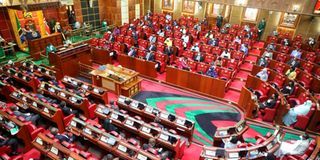Parliament has failed to cushion Kenyans from executive excesses

A joint sitting of Parliament during the State visit by Tanzanian President Samia Suluhu Hassan on May 5, 2021.
This week, Kenyans were yet again plunged deeper into a financial crisis by their democratically elected government. The price of fuel shot up to an unprecedented, if not ridiculous, high.
The pinch of the fuel prices shook an entire survival ecosystem, with everyone from commuters, motorists, industrialists to the players in the jua kali economy crying out that the government was squeezing economic life out of them.
The same week marked exactly one year since former Chief Justice David Maraga advised President Uhuru to dissolve Parliament, which he termed unconstitutionally constituted. However, we all know that Parliament and the Executive entered an unholy matrimony and split into Kieleweke and Tangatanga factions and completely forgot why the people sent them into the chambers.
Lost its independence
As it is now, Parliament can be considered an extension of the Executive, having lost its independence and power to legislate on behalf of Kenyans. The voice Wanjiku donated to them has been drowned by the cries for a more lenient treatment by the Jubilee government.
That explains why, while we all believe that it is Parliament that approved the VAT on fuel, former National Assembly Majority Leader and Garissa Town MP Aden Duale revealed Parliament rejected the bill. However, the
President used his powers under Article 115 of the Constitution of Kenya 2010 to assent to it. One could rightly argue that Parliament has failed in its legislative role. It also qualifies the view that MPs took political sides and pledged their loyalty to their political tin gods and absconded their duty towards the citizens.
A ray of hope, however, shines from the judiciary. The High Court ruling that the minimum tax was unconstitutional was a win for Kenyans.
As the only institution whose independence remains affirmed, it is right to support and protect the Judiciary. It is also time to rethink the role of Parliament in advancing the national agenda.
The writer is an advocate of good governance and Risk and Insurance Consultant at Half-moon Africa Holdings.





